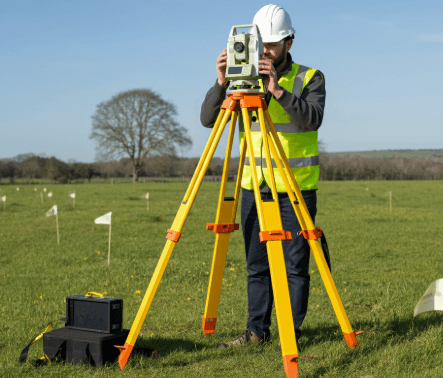Understanding surveying and boundary considerations for land buyers is vital for anyone purchasing property. Did you know that boundary disputes are one of the leading causes of legal issues in real estate, with surveys helping avoid these costly conflicts? Accurate surveying ensures you know exactly what you’re buying, from the property lines to existing encroachments or easements. Renowned real estate investors, Steve Daria and Joleigh, strongly emphasize the importance of professional boundary surveys to protect investments and prevent unpleasant surprises later. Whether you’re buying land for the first time or expanding your portfolio, considering these factors can save you thousands in legal fees and ensure smooth ownership. Surveys also provide crucial data for construction projects, helping you comply with zoning regulations and avoid neighboring disputes. Want expert insights and guidance? Book a free discussion with Steve Daria and Joleigh today to confidently address all your surveying and boundary considerations for land buyers!
What is land surveying, and why is it important for buyers?
Land surveying is the process of measuring and mapping land to determine its boundaries, size, and any physical features on it.
For buyers, understanding surveying and boundary considerations for land buyers is crucial because it ensures you are purchasing exactly what you think you are.
A professional survey creates a precise map of the property, marking the edges of the land and identifying easements, encroachments, or any boundary discrepancies.
This helps avoid potential legal disputes with neighbors and confirms that no one else has the right to use parts of your property.

Land surveys also protect buyers from surprises, like discovering a fence inside their boundary or a neighbor has built onto their land.
Additionally, surveys are essential when planning construction, ensuring all projects comply with zoning rules and property lines.
Proper surveying guarantees smooth transactions and safeguards your investment, whether it’s your first land purchase or the latest addition to your portfolio.
By paying attention to surveying and boundary considerations for land buyers, you can confidently buy and avoid unnecessary risks.
Get Started: Get Your Cash Offer Below…
We are direct land buyers. There are no commissions or fees and no obligation whatsoever. Start below by sharing where your property is and where we can send your offer…
What are the risks of purchasing land without a survey?
Purchasing land without a survey can lead to costly and stressful problems down the road.
You risk buying land with unclear or disputed boundaries without understanding surveying and boundary considerations for land buyers.
This could result in overlapping claims with neighbors, leading to legal battles or costly resolutions.
You might also unknowingly inherit issues like encroachments, where a neighbor’s structure crosses onto your property, or easements that allow others to use your land.
A survey ensures you know these issues upfront, saving you from surprises after the purchase.
Additionally, not having a survey could mean that building projects like fences or homes are placed in the wrong location, potentially violating zoning laws or property lines.
Skipping a survey also makes it harder to secure title insurance, which protects you from ownership disputes.
By taking the time to understand surveying and boundary considerations for land buyers, you can make sound choices and safeguard your investment for the long term.
What should land buyers look for when hiring a surveyor?
- Experience and Qualifications: Choose a surveyor with plenty of experience and the proper certifications or licenses. An experienced professional is more likely to spot issues and deliver accurate results, giving you peace of mind.
- Understanding of Local Laws and Regulations: Ensure the surveyor knows local zoning laws and property regulations. This ensures that their work complies with legal requirements and that they can provide proper advice for your area.
- Clear Communication: A good surveyor should be able to explain the process, findings, and potential issues in simple terms. If they communicate clearly, you’ll better understand your property and any concerns you need to address.
- Specialized Equipment and Technology: Look for surveyors who use up-to-date equipment, like GPS and drones, for accurate measurements. Modern tools often lead to more precise and faster results, ensuring a reliable land survey.
- Strong Reputation and Reviews: Check reviews or request references to understand the experiences of previous customers. A surveyor with positive feedback and a solid reputation is far more likely to deliver reliable results and exceptional service.

Are all property surveys the same, or do they serve different purposes?
Not all property surveys are the same, as they fulfill various purposes based on the specific needs of land buyers or property owners.
Understanding the role of surveying and boundary considerations is important because each type of survey provides specific information.
A boundary survey, for example, focuses on identifying the exact property lines and uncovering any disputes or encroachments.
On the other hand, a topographic survey maps the physical features of the land, such as elevations, trees, and slopes, which is especially useful for construction or landscaping projects.
ALTA/NSPS surveys are also more detailed and used for commercial properties or when a lender requires additional details for title insurance.
Subdivision surveys divide larger parcels of land into smaller lots, while construction surveys help ensure buildings are correctly placed within property lines.
By choosing the right survey for your situation, you can make sound choices and address any legal or logistical challenges that may arise.
Surveying and understanding boundary considerations are essential for land buyers to protect their investment and ensure the property aligns seamlessly with their expectations.
How much does a complete survey typically cost?
- Survey Type: The cost depends on the type of survey you need. A simple boundary survey may cost less, while a detailed ALTA/NSPS survey for commercial properties can be more expensive.
- Property Size: Larger properties usually cost more to survey because they require more time and resources. Smaller lots, such as residential properties, are typically less expensive.
- Location of the Property: Location can also affect the price. Properties in remote or hard-to-access areas often cost more to survey than those in well-connected regions.
- Complexity of the Land: If the property has uneven terrain, thick vegetation, or other challenges, it might increase costs. Easier-to-survey properties, like flat and clear land, are usually less expensive.
- Surveyor’s Expertise: Experienced surveyors and professionals using advanced tools often command higher fees for their services. While this increases the cost, it guarantees precise and dependable results.
- Turnaround Time: If you need the survey completed quickly, it may come with additional rush fees. Scheduling in advance can help you avoid these extra charges.
- Local Regulations: Some areas have specific requirements that may increase survey costs, such as needing additional documentation or certifications. To understand any added expenses, it’s important to check local rules before starting the survey.
What documents do I need before scheduling a boundary survey?
Before scheduling a boundary survey, gathering a few key documents is essential to make the process smoother and more accurate.
Start with the property deed, which provides essential details like the property’s legal description and previous ownership records.
If you have any existing surveys or plans, include those, as they can give the surveyor a better starting point.
A title report or insurance policy is also helpful, as it may highlight easements, rights-of-way, or any legal restrictions tied to the land.
Be sure to provide recent tax records or assessments, as these often include relevant property details.
If available, zoning or development plans can guide the surveyor in understanding how the land may be used.
Having these documents ready ensures the surveyor has all the information needed for accurate results.
When it comes to surveying and boundary considerations for land buyers, being prepared with the right paperwork can save time and prevent costly mistakes.
Experts like Steve Daria and Joleigh, seasoned real estate investors and land buyers for cash, always emphasize the value of thorough preparation.
If you’re ready to move forward, don’t hesitate to gather your documents and consult a professional surveyor today!
Takeaway
- Know Your Boundaries: A survey can clearly identify the exact property lines, helping you avoid disputes with neighbors or encroachments on your land. Knowing your boundaries ensures you’re buying what you expect.
- Understand the Types of Surveys: Different surveys serve different purposes, like identifying property lines, mapping physical features, or dividing land into smaller sections. Choosing the right type of survey for your situation ensures accurate and useful results.
- Recognize the Risks of Skipping a Survey: Without a survey, you risk buying land with hidden issues like easements, zoning restrictions, or overlapping boundaries. A survey protects your investment and keeps you informed about potential problems.
- Prepare the Right Documents: Having key paperwork like property deeds, existing surveys, and title reports ensures the surveyor has everything needed for accurate results. Being prepared saves time and prevents delays in the surveying process.
- Invest in Experienced Professionals: Hiring a qualified, experienced surveyor is crucial to getting precise and reliable information. A good surveyor helps you make informed decisions and minimizes costly mistakes during your land purchase.
**NOTICE: Please note that the content presented in this post is intended solely for informational and educational purposes. It should not be construed as legal or financial advice or relied upon as a replacement for consultation with a qualified attorney or CPA. For specific guidance on legal or financial matters, readers are encouraged to seek professional assistance from an attorney, CPA, or other appropriate professional regarding the subject matter.
